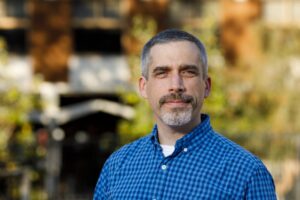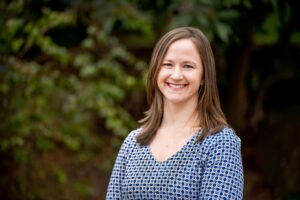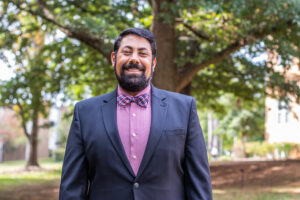Faculty members Katie Ehrlich and Beshoy Morkos have been named as the Office of Research Faculty Fellows for 2023-24, and the pair will spend this year getting an up-close view at research administration at UGA.
The Office of Research piloted the Faculty Fellows Program last year as a way to train potential future leaders across its many areas of administrative responsibility. Now in full operation, the program allows for the selection of two full-time faculty who will be embedded within the Office of Research senior leadership team.
“If you’re interested in helping people meet their goals in terms of research, this is a good forum to do that. The university has a number of excellent resources, and there are emerging needs on campus,” said Eric Ferreira, associate professor in the Department of Chemistry, who served as the inaugural Faculty Fellow last year. “One example: The I-STEM buildings’ construction enabled a sequence of movements and renovation projects that are going to allow upgrades of facilities for many programs in the sciences.”
Ehrlich is an associate professor in the Behavioral and Brain Sciences Program in the Franklin College of Arts and Sciences Department of Psychology. Her research focuses on how children’s social experiences shape their mental and physical health.
“I’m excited to learn more about how the Office of Research supports the entire research enterprise,” Ehrlich said, “from developing large interdisciplinary grant proposals to executing those projects once those grants are awarded.”
Morkos is an associate professor in the College of Engineering whose research group focuses on developing computational representation and reasoning using model-based approaches to support complex system design and manufacturing.
Ehrlich began the program this fall. Morkos won’t formally begin until next spring but has already engaged as well. The pair hope the program will equip them with administrative capabilities to pursue larger, more complex efforts like large-team collaborations.
“Pursuing fundamental research solely within disciplinary domains has become inadequate, as the complexity of problems has surpassed the capacity of individual academic fields,” Morkos said. “This program will provide me with an opportunity to learn the intricate system that underpins our research pursuits by offering valuable insights into the fundamental mechanisms and governing principles operating behind the scenes.”
Morkos said he is excited about using his Faculty Fellow experience to equip himself with the necessary skills and operational understanding to lead large research initiatives, interface with industry, and mentor junior faculty.
Meanwhile Ferreira said the program broadened his perspective on how a university operates, as he was exposed to new stakeholders around campus, trying to leverage resources to help capitalize on opportunities between different units.
“Sometimes understanding more about the different research programs on campus gives you an opportunity to learn how you might strike up collaborations or see how other people are thinking about challenges at the forefront of their fields,” Ferreira said.










